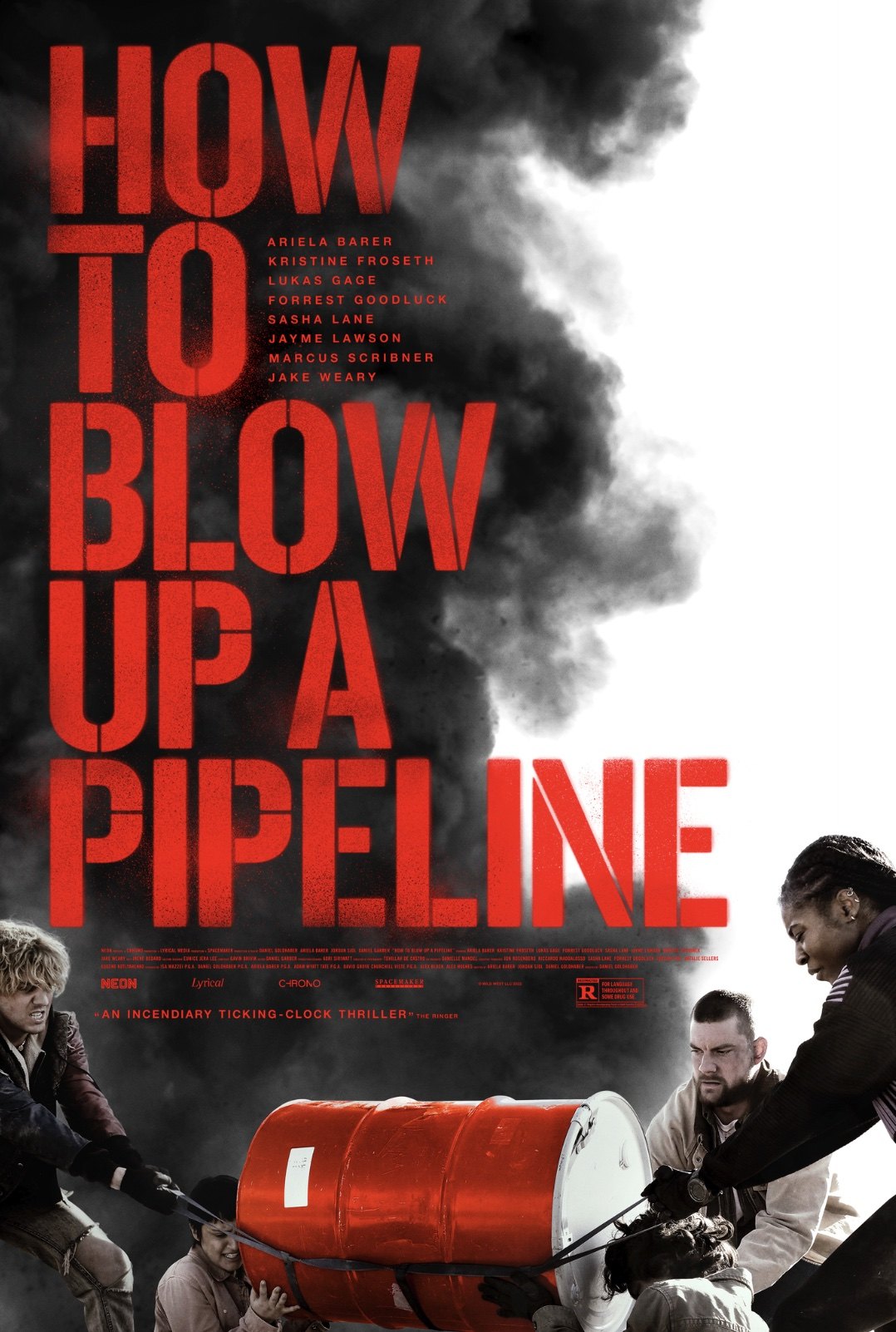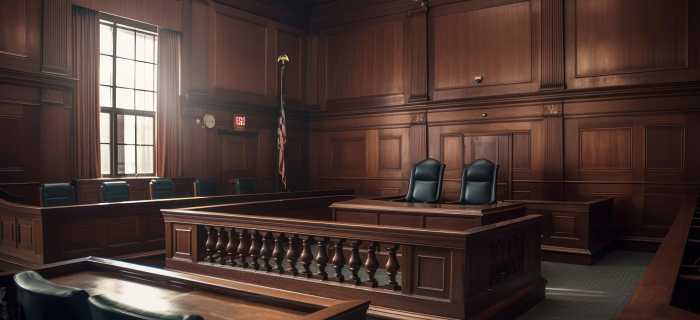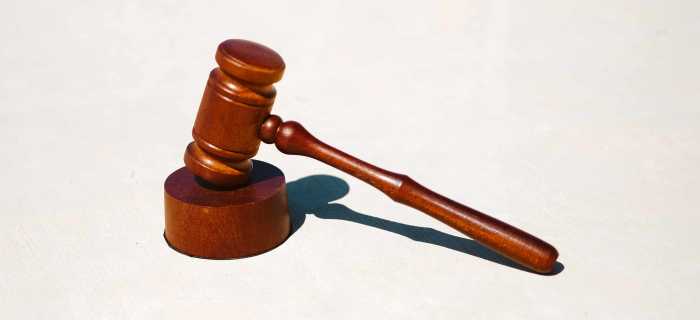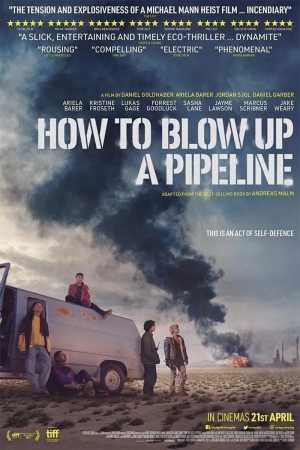How to Blow Up A Pipeline: Do the Actions of Climate Activists Qualify as a form of Self Defence?

The movie How to Blow Up A Pipeline is about climate activism taken to an extreme. The movie features characters living in a future where the human impact on the environment is massive. At one point, the young characters talk about living as children with the impacts of being exposed to acid rain. The air of the planet and nature as we know it is gone and the movie takes place in a future Earth where the land is beginning to look like the surface of Mars. Without trees. Without life. And with humans, the only ones left.

The movie uses this dystopia backdrop to tell a story about a group of young people tired of their world as is and looking to take action. Together they plot out and execute a plan, as the title of the movie makes apparent, to blow up a pipeline used to transport oil. The hope is that the price of oil will shift as a result of the attack. Finally, there will be a political incentive to move away from sources of energy that damage the planet. While doing this, one of the main characters brings along an assumption for their actions.
Knowing that she will be caught, Theo talks about the justification for their actions through self-defence. She claims that when they are caught, the protagonists of the story will be able to use self-defence to justify their actions in court. The decision of the court, according to Theo, will be in favour of the eco-terrorists who acted to prevent their planet being destroyed further with the use of fossil fuels. The movie concludes before showing the audience what the authorities will make of the actions of the eco-terrorists. Is Theo right or wrong to think that the groups actions of blowing up the pipeline will qualify as justified as they were done out of necessity and in self defence?
How has Self-Defence Been Used by Someone Accused of a Serious Crime?

Self-defence is a concept traditionally understood in legal terms of one person coming to the aid of another or defending themselves against someone attacking them. Section 3 of the Criminal Laws Act 1967 in the United Kingdom for instance states that “a person may use such force as is reasonable in the circumstances in the prevention of a crime”. The Criminal Code of the United States states something similar, talking about the attacked having the “privilege” to defend themselves with use of reasonable force and against an imminent attack or unlawful action.
Self-defence does not mean however that one is justified in standing their ground in a fight where they have routes of escape for instance or where the force they choose to use escalates the confrontation. In the UK case of R v Rose in 1884, a young man shot dead his father as he believed that it was the only way to protect his mother from similar harm. In that instance, the court agreed, and the charge of murder was put to one side. In the United States, in the Supreme Court case of Bad Elk v United States, an off duty police officer was given a new trial having shot an on-duty police officer who was arresting him illegally. This case shows what is sometimes called imperfect self defence where the charge of murder is turned into the lower charge of manslaughter through self defence.
A careful read of different judgments involving self-defence reveals that those using it have to fit certain criteria. They cannot, for instance, use force against someone they think without reason will attack them or start a conflict with someone in self defence. If I attack you first with a knife, I cannot claim self defence unless it can be shown you did something to think you also had a knife or my life was in some way imminently in danger. It is clear that the way self defence is described that there are limitations on how it can be used. Having said that, this has not stopped people using the defence creatively.
Facing Charges of Whistleblowing

In 2003 a linguist and translator working for the intelligence agency the GCSB in the United Kingdom read an email that talked about doing something illegal. The email talked about spying on members of the United Nations Security Council to find out how they would vote ahead of time on the invasion of Iraq. The linguist, Katherine Gunn, decided to share the email with the press. When it was finally revealed to the public and Katherine discovered to be the source of the leaked email, Katherine faced charges of breaking the Official Secrets Act.
The events of this, including the legal battle that followed, are portrayed in the 2019 movie Official Secrets with Keira Knightley playing Katherine. In that movie, as in real life, Katherine used self defence against charges under the Official Secrets Act. Her lawyer focused on the actions of the Prime Minister, and whether he had been advised about the war in Iraq being illegal. It turns out that there was advice suggesting that a UK and US invasion of Iraq in 2003 would be illegal, and Katherine’s lawyers used that to support a case that Katherine did what she did in defence of those who would be harmed from the United Kingdom being involved in an illegal war.
Rather than allow that to go ahead, the case was dropped against Katherine and her trial brought to a swift halt. Katherine was let free as the United Kingdom did not want to have to show that their war was legal knowing in fact that it was not. A lot of attention focused on the trail but also the defence used by Katherine. The United Kingdom did not want to embarass itself and throw itself in front of further public criticism. This ultimately suggests that while self defence can deter the state from charging someone accused of a serious crime, it only worked in getting the case dropped.
Facing Charges of Destroying Property

In 2013, three men proceeded to enter a facility in New Zealand used to collect signals as part of intelligence gathering. New Zealand is part of the spying network agreement called Five Eyes and the three men, knowing the facility was connected to spying activity with the United States, proceeded to damage parts of the facility. When the case went to court, the three accused used self defence and necessity to claim that what they did they did to prevent people in Iraq being killed as part of that illegal war. The judge had to decide whether based on the evidence the actions of the accused did really fit self defence or whether that was a stretch of the imagination.
Ultimately, on appeal, the court did not find in favour of the accused. Self defence and necessity were seen as too far of a stretch to qualify. The facts of the case, as they were reported by media at the time, indicate instead that the court felt that the actions of the accused were more consistent with a form of protest. They also did what they did not knowing of immediate danger to a specific person nor of how the facility in New Zealand was linked to actions happening in Iraq illegal or not. The men were as a result found guilty of trespassing and damaging property.
One of the main concerns put forward by the judge was that necessity can too easily become simply a mask for anarchy. Those with concerns about the actions of the state can pursue those concerns through legal forms of protest. They can start movements. They can petition lawmakers. As a result, necessity used by the accused was too much of a stretch because they had other ways forward open to them. As far as the court was concerned, their actions were not justified. While New Zealand is a long way from the southern United States where the events of How to Blow Up a Pipeline take place in the future, they do serve as an indication of the limits of self defence particularly when it comes to destroying property.
What Might the Judge Decide?

Judges cannot make any decision they would like to make. Ultimately, they have to use the decisions of the court in the past to justify the decision they are making. Anyone who takes the time to read a court judgment will quickly realize how thorough judges are with their decisions, particularly in legal systems like the United States, Canada, the United Kingdom, Australia and New Zealand. Any decision made by a judge can be used to persuade the court down the line. The latin phrase for this is called spare decisis but the phrase precedent is also used.
If we assume that something similar to the Katherine Gunn case and the spy facility trespassing case had occurred in the United States and the court ruled the same then we can go some way towards asking whether self defence will stand up in court for Theo. Just as in R v Rose, the response has to be in portion to the threat posed. While the use of fossil fuels can be shown to be a direct contributor to climate charge, it is not clear that transporting the oil around is directly linked to climate change by itself. While the use of the oil is the transporting of it is different. This is something that the court might have a problem with when it comes to Theo claiming self defence. The accused needs to establish their action were in portion to the peril involved from that particular pipeline and that particular oil company.

The problem with eco-terrorists taking matters into their own hands is that their damage to the pipeline may not be linked to preventing further destruction to the environment like they necessarily think. The oil being transported in the pipeline could be used as part of making devices like solar panels and windmills that would increase the portion of energy use that is coming from renewable sources. We don’t see the characters check any of this or know it for certain but it may be something that poses a problem for their claims that they did what they did to stop the company harming the environment. There is a clear problem here.
Just as it was a problem for the men who damaged a signal intelligence facility, so too is showing their actions were necessary for the eco-terrorists as they are portrayed in the movie How to Blow Up a Pipeline. When the justification of self defence is explored thoroughly is quicky falls apart. But one of the biggest problems for the use of self defence and necessity is that the characters each have different motivations for being involved in blowing up the pipeline. One character is motivated more by revenge against the oil company that stole his land then anything to do with the climate crisis. If they all end up in court together, then their different motivations coming to light in court would make arguing for necessity and self defence inconsistent with the facts of the case. It would really not be good for Theo’s original claims of how things will play out in court.
Future Lawmakers and the Court Not Ruling in Favour of Illegal Actions

While things do not look good for Theo and the group of eco-terrorists who work with her to blow up the pipeline, there may be a glimmer of hope for their use of self-defence and necessity. The group are focused on attacking the pipeline because of the damage it is causing to the environment. Fossil fuels have changed the atmosphere of the planet and a hot planet is a reality for the occupants of Earth. Trees are dead. Animals too. And all this may have meant lawmakers in the United States had finally come around to something like making the use of fossil fuels illegal or making actions linked to climate change against the law – including transporting oil.
One important twist would come out of this step having been made by the lawmakers of the future. Applying the 1775 decision of Holman v Johnson, the judge stated that “No court will lend its aid to a man who founds his cause of actions upon an immoral or an illegal act”. Applying the Latin phrase ex turpi causa which translates to: no action from the court in favour of those who have done something illegal. Just as a robber cannot sue the owner of the house he robs because the floor was slippery and he fell, so too can those who act illegally not seek assistance from the court with regard to their illegal actions.

If using oil and fossil fuels happens to be illegal in the future when Theo and her accomplices blow up a pipeline then ex turpi causa could be a defence they could use should they be taken to court for their actions. The court cannot aid a commercial pollutor through its decision to prosecute eco-terrorists. If the use of the pipeline was illegal and posed a threat to the environment and the survival of those in the United States like Theo, then this would change things. While the defence hinges on the pipeline being illegal, this does make an argument of self defence stronger but not certain to stand up in court. The fact that Theo and others did acts of terrorism planning on using self defence may also pose a problem for them down the line. If there is one thing that judges don’t like it is potential reoffenders.
While Theo and her court battle may well come with a number of twists and turns that did not play out in the film, it is worth noting the protagonists are only left depicted as the protagonists because the events are seen through their lens. Their focus on the issue of how big companies are damaging the planet in the film keeps the audience fixed on the characters being justified in their attack on the pipeline. A judge may come to a different conclusion when factoring in the choices open to the characters and if destroying a pipeline is the only way for them to get their message across. Based on the cases covered above, the claims of self defence in the movie are extremely questionable. Better to stick to legal forms of activism than assume technical legal concepts like self defence will always provide a way out.
What do you think? Leave a comment.











The world is such a sad state of affairs. This is an important story but will not be watched by the people that need to see it.
This movie ain’t wrong
But it ain’t super good either.
A great flick for people who love a real step by step plot.
One of the more interesting aspects of this is its emphasis on personal victimization as the inciting factor for participation in eco-terrorism. Nearly every member of the crew is sick or maligned by oil in a direct way (suffering from leukemia, reeling from the death of a loved one, facing preemptive eviction and legal action). It is both realistic and disheartening that action rarely takes place until one is directly and viscerally affected by an external threat or injustice.
it is in my humble opinion that this movie ends up, either accidentally or on purpose, serving the interests of the very people they seem to be against and i lean towards thinking that it is on purpose.
The premise of this movie was very interesting to me, but watching it was kinda 🤷🏽♂️
A brave movie that i’m so glad was made.
My kinda terror. 😉
I think people forget that the whole point of these things is to cause an inconvenience and/or a disruption. And this is how we’ve secured so many rights for women, POC, LGBTQ+, people with disabilities, etc. I think it’s a lot harder to fight against large corporations such as oil conglomerates as opposed to the government (I’m not saying it’s easy, obviously it’s still a struggle, but ultimately the government, in theory, is run by people, while oil companies are run by money and greed), so the disruption has to be larger and have a harsher impact. So it’s interesting to see this happen from the perspective of young people trying to make a positive change by using something that is, at first, perceived as negative.
I loved how it was filmed as like a documentary!
I’ll compare this to oppenheimer: two films this year that came down squarely in the center of an ethical argument, seemingly with no desire to pick a side. oppenheimer straddles the line much better than this one, however. in the end, blowing up a pipeline is still an act of eco-terrorism, and though the movie raises some arguments to this point they are brushed easily to the side in the name of extreme activism. the conversations about whether mlk and/or jesus were terrorists read as half parody and half interactions i would genuinely expect to find on twitter. not sure what that says about twenty first century america.
We have nothing to lose but our chains. And there is a whole world to win.
Good film. Writing feels a bit too structured and formulaic for my tastes, and characters felt cliche and too timely, but it does a good job at what it sets out to do by showing how environmental issues touch every part of humanity/society.
People that aren’t invested in this topic in some way aren’t gonna take much from it either. What’s a movie to do?
This movie should be a way bigger deal!
Great firestarter of a message that reflects a mirror to society.
I think its entertaining and it works as a thriller, but if u think about it for more than two seconds, its ruined. i dont want to be a dick, but i cant shake the feeling that there is some malicious intent behind this or at the very least, dangerous ignorance. i looked up a bit on the filmmaking process and it sounds like they are actually trying to push people to build bombs, showing how “accesible” it is. and while that isn’t bad per say, the way it goes about it is insane. neither movie nor book are good sources on radicalization and direct action. they paint a sympathetic picture to why violence is necessary, but just fail at execution.
This could have been so much better. But as a heist movie, I guess it passes.
Movie lacked so much in characterisation.
This has to stop. One pipeline at a time.
Somehow this film looks like it was shot on 90’s film stock, which complements it’s punk ethos massively.
Surprised this flew under the radar as much as it did, but it could be due to the subject matter.
Great article. This movie made me want to burn jets and tie up myself to a pine.
The problem with a lot of activism today is that less than centrered, its more performative. Everything is a push from behind closed curtains and firewalled screens, only a few have the gall to actually bring a change.
I’m reminded of a limp film like Trial of the Chicago 7 where youthful rebellion is a thing THAT HAPPENED but society is BETTER NOW. Uprisings are cast of things of the past where their messier details are ironed out into neat stories that become dusty fables.
Nice writeup and discussion. It’s kind of amazing this movie exists, but I feel it will continue to speak to audiences until we either meet the challenge of climate change or the Earth is a cinder.
Gave me real ministry of the future vibes…
This movie makes me want to go blow up a pipeline (i’m not actually gonna do it).
Why did it take my little anarchist arse so long to watch this?
Screw anyone who doesn’t believe in climate change.
It’s a movie that speaks to our times in a voice that people may not want to hear but they need to.
There have been pro-environmental and even pro-ecoterrorism movies/pieces of media before, but most of them (at least the ones I’ve seen) are done through sci-fi/fantasy settings or try too hard to disconnect itself from the real world and any real solutions. This movie doesn’t have that problem, so kudos to the team who made this for having the guts to make a film with such a direct message on the usage of property destruction as a means to fight climate change.
Such a daring and divisive premise!
Pumped to watch this because it sounds similar to Night Moves, which i love.
HOW TO BLOW UP A PIPELINE reminded me of WEATHER UNDERGROUND and the movie made about their work in 1969-77.
The fictional movie was THE COMPANY YOU KEEP from 2012 which starred Robert Redford
and there was a documentary film that same year as well.
My second favorite “bomb centered film set in the southwest that left me dead inside” of the year.
This is what I tell myself my environmental science degree is going to get me.
How to make friends and blow stuff up with them.
The only heist movies I want to see from now on are eco-terrorism heist movies.
I disagree with their methods and definitely *don’t* think we should follow in the footsteps laid out.
This movie gave me more anxiety than Uncut Gems.
The most hardcore episode of This is Us ever made.
Still don’t know how. 🙂
As someone who revised this article, it is good to see it live on the site! Thought-provoking and a great read! Thank you!